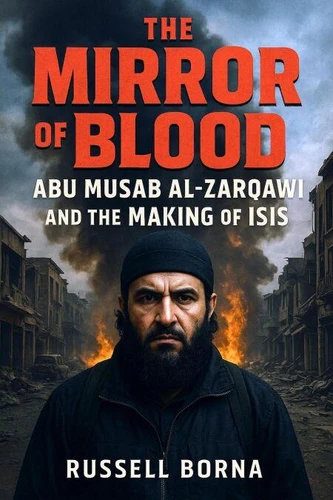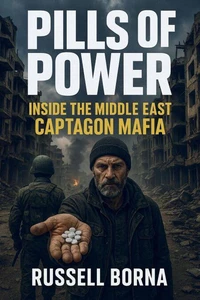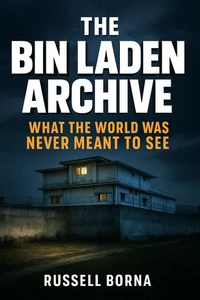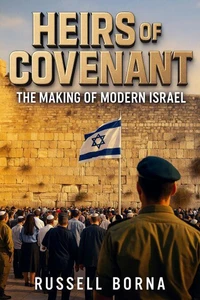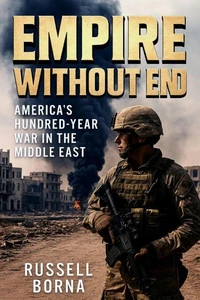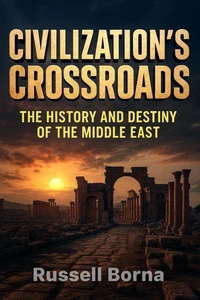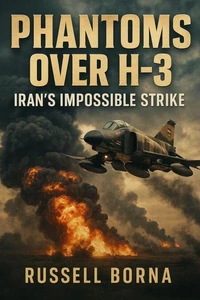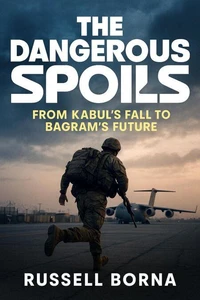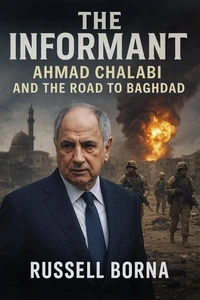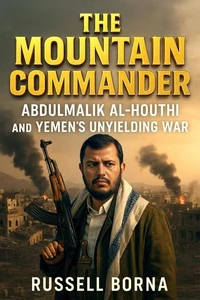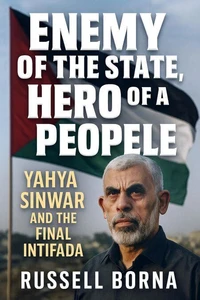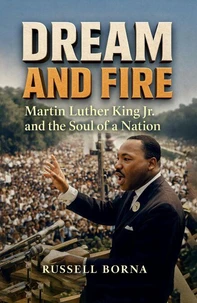Nouveauté
The Mirror of Blood: Abu Musab al Zarqawi and the Making of ISIS
Par :Formats :
Disponible dans votre compte client Decitre ou Furet du Nord dès validation de votre commande. Le format ePub est :
- Compatible avec une lecture sur My Vivlio (smartphone, tablette, ordinateur)
- Compatible avec une lecture sur liseuses Vivlio
- Pour les liseuses autres que Vivlio, vous devez utiliser le logiciel Adobe Digital Edition. Non compatible avec la lecture sur les liseuses Kindle, Remarkable et Sony
 , qui est-ce ?
, qui est-ce ?Notre partenaire de plateforme de lecture numérique où vous retrouverez l'ensemble de vos ebooks gratuitement
Pour en savoir plus sur nos ebooks, consultez notre aide en ligne ici
- FormatePub
- ISBN8232693404
- EAN9798232693404
- Date de parution04/11/2025
- Protection num.pas de protection
- Infos supplémentairesepub
- ÉditeurHamza elmir
Résumé
The Mirror of Blood {The Mirror of Blood: Abu Musab al-Zarqawi and the Making of ISIS} is an unflinching journey through the making of a modern monster - a man forged in poverty, refined in prison, and unleashed upon a fractured world. From the dust-choked alleys of Zarqa to the infernos of Baghdad and Fallujah, the book traces how one Jordanian outlaw transformed personal rage into a movement of apocalyptic terror that reshaped the Middle East and reverberated across the globe.
This is not merely the biography of Abu Musab al-Zarqawi; it is the anatomy of a phenomenon - the rise of jihadist extremism in the vacuum left by war, humiliation, and neglect. It explores how ideology fused with revenge, how faith was weaponized into hate, and how a single man's crusade against both occupiers and fellow Muslims ignited a sectarian war that would give birth to the Islamic State. Drawing from declassified intelligence, survivor testimonies, and contemporary reports, the narrative follows Zarqawi's journey from a reckless youth in Jordan to his radical transformation behind bars, his travels through the training camps of Afghanistan and Pakistan, and his eventual emergence as the self-declared Emir of al-Qaeda in Iraq.
The book delves deep into his calculated use of propaganda, his obsession with spectacle, and his strategy of provocation - a campaign designed to fracture nations and fuel endless revenge.{The Mirror of Blood} also examines the geopolitical and moral landscape that enabled his ascent. It exposes the failures of intelligence, the moral blindness of occupation, and the social collapse that turned Iraq into a crucible for extremism.
Yet it goes further - exploring how Zarqawi's ideology outlived him, mutating into ISIS and spreading its shadow across Syria, Libya, and beyond. His death in 2006 did not end his war; it only multiplied it. Part biography, part investigation, and part reflection, {The Mirror of Blood} forces readers to confront uncomfortable truths: that fanaticism is rarely born in isolation; that terror thrives where justice fails; and that the monsters of history often rise from the soil of neglect.
As the narrative unfolds, it becomes clear that Zarqawi's life is both a warning and a mirror - reflecting not only the darkness of one man's heart but also the complicity and silence of a world that allowed him to matter. A story of violence, ideology, and the enduring struggle between faith and fury, this book stands as a definitive account of how Abu Musab al-Zarqawi - the butcher of Iraq - became the architect of modern terror, and how his shadow continues to haunt the conscience of nations.
This is not merely the biography of Abu Musab al-Zarqawi; it is the anatomy of a phenomenon - the rise of jihadist extremism in the vacuum left by war, humiliation, and neglect. It explores how ideology fused with revenge, how faith was weaponized into hate, and how a single man's crusade against both occupiers and fellow Muslims ignited a sectarian war that would give birth to the Islamic State. Drawing from declassified intelligence, survivor testimonies, and contemporary reports, the narrative follows Zarqawi's journey from a reckless youth in Jordan to his radical transformation behind bars, his travels through the training camps of Afghanistan and Pakistan, and his eventual emergence as the self-declared Emir of al-Qaeda in Iraq.
The book delves deep into his calculated use of propaganda, his obsession with spectacle, and his strategy of provocation - a campaign designed to fracture nations and fuel endless revenge.{The Mirror of Blood} also examines the geopolitical and moral landscape that enabled his ascent. It exposes the failures of intelligence, the moral blindness of occupation, and the social collapse that turned Iraq into a crucible for extremism.
Yet it goes further - exploring how Zarqawi's ideology outlived him, mutating into ISIS and spreading its shadow across Syria, Libya, and beyond. His death in 2006 did not end his war; it only multiplied it. Part biography, part investigation, and part reflection, {The Mirror of Blood} forces readers to confront uncomfortable truths: that fanaticism is rarely born in isolation; that terror thrives where justice fails; and that the monsters of history often rise from the soil of neglect.
As the narrative unfolds, it becomes clear that Zarqawi's life is both a warning and a mirror - reflecting not only the darkness of one man's heart but also the complicity and silence of a world that allowed him to matter. A story of violence, ideology, and the enduring struggle between faith and fury, this book stands as a definitive account of how Abu Musab al-Zarqawi - the butcher of Iraq - became the architect of modern terror, and how his shadow continues to haunt the conscience of nations.
The Mirror of Blood {The Mirror of Blood: Abu Musab al-Zarqawi and the Making of ISIS} is an unflinching journey through the making of a modern monster - a man forged in poverty, refined in prison, and unleashed upon a fractured world. From the dust-choked alleys of Zarqa to the infernos of Baghdad and Fallujah, the book traces how one Jordanian outlaw transformed personal rage into a movement of apocalyptic terror that reshaped the Middle East and reverberated across the globe.
This is not merely the biography of Abu Musab al-Zarqawi; it is the anatomy of a phenomenon - the rise of jihadist extremism in the vacuum left by war, humiliation, and neglect. It explores how ideology fused with revenge, how faith was weaponized into hate, and how a single man's crusade against both occupiers and fellow Muslims ignited a sectarian war that would give birth to the Islamic State. Drawing from declassified intelligence, survivor testimonies, and contemporary reports, the narrative follows Zarqawi's journey from a reckless youth in Jordan to his radical transformation behind bars, his travels through the training camps of Afghanistan and Pakistan, and his eventual emergence as the self-declared Emir of al-Qaeda in Iraq.
The book delves deep into his calculated use of propaganda, his obsession with spectacle, and his strategy of provocation - a campaign designed to fracture nations and fuel endless revenge.{The Mirror of Blood} also examines the geopolitical and moral landscape that enabled his ascent. It exposes the failures of intelligence, the moral blindness of occupation, and the social collapse that turned Iraq into a crucible for extremism.
Yet it goes further - exploring how Zarqawi's ideology outlived him, mutating into ISIS and spreading its shadow across Syria, Libya, and beyond. His death in 2006 did not end his war; it only multiplied it. Part biography, part investigation, and part reflection, {The Mirror of Blood} forces readers to confront uncomfortable truths: that fanaticism is rarely born in isolation; that terror thrives where justice fails; and that the monsters of history often rise from the soil of neglect.
As the narrative unfolds, it becomes clear that Zarqawi's life is both a warning and a mirror - reflecting not only the darkness of one man's heart but also the complicity and silence of a world that allowed him to matter. A story of violence, ideology, and the enduring struggle between faith and fury, this book stands as a definitive account of how Abu Musab al-Zarqawi - the butcher of Iraq - became the architect of modern terror, and how his shadow continues to haunt the conscience of nations.
This is not merely the biography of Abu Musab al-Zarqawi; it is the anatomy of a phenomenon - the rise of jihadist extremism in the vacuum left by war, humiliation, and neglect. It explores how ideology fused with revenge, how faith was weaponized into hate, and how a single man's crusade against both occupiers and fellow Muslims ignited a sectarian war that would give birth to the Islamic State. Drawing from declassified intelligence, survivor testimonies, and contemporary reports, the narrative follows Zarqawi's journey from a reckless youth in Jordan to his radical transformation behind bars, his travels through the training camps of Afghanistan and Pakistan, and his eventual emergence as the self-declared Emir of al-Qaeda in Iraq.
The book delves deep into his calculated use of propaganda, his obsession with spectacle, and his strategy of provocation - a campaign designed to fracture nations and fuel endless revenge.{The Mirror of Blood} also examines the geopolitical and moral landscape that enabled his ascent. It exposes the failures of intelligence, the moral blindness of occupation, and the social collapse that turned Iraq into a crucible for extremism.
Yet it goes further - exploring how Zarqawi's ideology outlived him, mutating into ISIS and spreading its shadow across Syria, Libya, and beyond. His death in 2006 did not end his war; it only multiplied it. Part biography, part investigation, and part reflection, {The Mirror of Blood} forces readers to confront uncomfortable truths: that fanaticism is rarely born in isolation; that terror thrives where justice fails; and that the monsters of history often rise from the soil of neglect.
As the narrative unfolds, it becomes clear that Zarqawi's life is both a warning and a mirror - reflecting not only the darkness of one man's heart but also the complicity and silence of a world that allowed him to matter. A story of violence, ideology, and the enduring struggle between faith and fury, this book stands as a definitive account of how Abu Musab al-Zarqawi - the butcher of Iraq - became the architect of modern terror, and how his shadow continues to haunt the conscience of nations.

